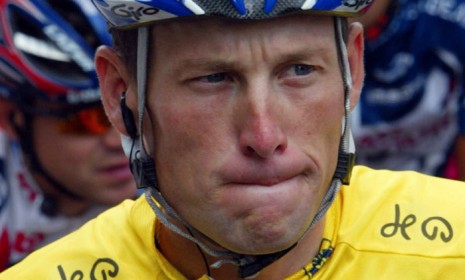What's next for Lance Armstrong?
The seven-time Tour de France champ, sick of fighting doping allegations, will likely face a lifelong ban from the sport — and potentially be stripped of his titles

A free daily email with the biggest news stories of the day – and the best features from TheWeek.com
You are now subscribed
Your newsletter sign-up was successful
Late Thursday, Lance Armstrong announced that he would stop fighting allegations from the U.S. Anti-Doping Agency (USADA) that he used banned substances throughout his celebrated and controversial cycling career. Now, the USADA wants to strip Armstrong of all seven of his Tour de France titles, and is slapping the Texan with a lifelong ban from the sport. In a statement, the cancer survivor who inspired millions through his Livestrong campaign called the USADA's ongoing investigation an "unconstitutional witch hunt," concluding that "there comes a point in every man's life when he has to say, 'Enough is enough.' For me, that time is now." Here's what you should know:
What exactly is Armstrong accused of?
The USADA says Armstrong deserves a lifetime ban because of "his numerous anti-doping rule violations, including his involvement in trafficking and administering doping product to others." The drug regulation group claims to have at least 10 witnesses, including several of Armstrong's former teammates, who claim the seven-time Tour de France champion illegally used performance-enhancing substances like EPO (a hormone that helps with oxygen delivery), blood transfusions, testosterone, cortisone, and HGH (human growth hormone) to gain an unfair competitive advantage.
The Week
Escape your echo chamber. Get the facts behind the news, plus analysis from multiple perspectives.

Sign up for The Week's Free Newsletters
From our morning news briefing to a weekly Good News Newsletter, get the best of The Week delivered directly to your inbox.
From our morning news briefing to a weekly Good News Newsletter, get the best of The Week delivered directly to your inbox.
Aren't cyclists tested for these drugs?
They are. And Armstrong never failed an official test. But tests for illicit substances like EPO aren't simple "yes-no" matters, says Barry Petchesky at Deadspin. "Instead, multiple blood samples are taken and compared to baseline readings to determine if the rider is using something artificial." Plus, EPO testing didn't even exist until 2000, and wasn't successfully used to catch rule-breakers until years later. And the testing mechanism is still far from perfect: A 2008 study sent identical blood samples to two World Anti-Doping Agency laboratories; the two labs came back with "completely different results."
Why isn't Armstrong fighting these charges?
Despite his strong words, Armstrong's decision could be a "tacit admission of guilt," says David Roth at The Wall Street Journal. Of course, Armstrong's team "is spinning this as a sort of ethical victory," arguing that fighting the USADA has just proved too draining.
A free daily email with the biggest news stories of the day – and the best features from TheWeek.com
Can the USADA really strip him of his titles?
That's a matter of contention. Armstrong "can still hold out hope that he'll ultimately be able to retain his Tour de France titles, as race organizers and the international cycling body wrestle with the USADA over who has the authority to strip the cyclist of his wins," says Rick Maese at The Washington Post. The USADA oversees anti-doping efforts in Olympic sports in the U.S, but the agency "does not have the authority to bring criminal charges," and is instead encouraged to "levy charges that result in suspensions and the rescinding of awards." For its part, the International Cycling Union, which, along with the USADA, is a signatory of the World Anti-Doping Code, "does not appear eager" to give the USADA the right to seize Armstrong's yellow jerseys, says the Journal's Roth, meaning "more legal wrangling is likely."
If Armstrong loses, who gets his titles?
That's quite complicated. "Most of the second place finishers to Armstrong have their fair share of conspiracies and allegations as well," says Kate Tabers at Yahoo Sports. For example: The runner-up in 1999, Alex Zulle, was banned from the 1998 Tour de France due to doping allegations. And 2000, 2001, and 2003 winner Jan Ulrich was banned in 2006 with a doping scandal of his own. There are plenty of other conflicts of the same sort.
What's next for Armstrong?
Armstrong will probably be banned from other World Anti-Doping Agency events, ending his career as a triathlete. But in the end, his work through his Livestrong foundation "and the number of people he has inspired, the number of victims of cancer who saw him and did feel strong" will form "the central aspect of Armstrong's legacy, whether or not he was a blood doper," says Will Leitch at New York. "Armstrong might not have deserved to be the guy to have inspired so many people, but nevertheless he was the one who did: That matters."
Sources: Deadspin, Los Angeles Times, New York, Sports Illustrated, USA Today, Wall Street Journal, Washington Post, Yahoo Sports
-
 Why is the Trump administration talking about ‘Western civilization’?
Why is the Trump administration talking about ‘Western civilization’?Talking Points Rubio says Europe, US bonded by religion and ancestry
-
 Quentin Deranque: a student’s death energizes the French far right
Quentin Deranque: a student’s death energizes the French far rightIN THE SPOTLIGHT Reactions to the violent killing of an ultraconservative activist offer a glimpse at the culture wars roiling France ahead of next year’s elections
-
 Secured vs. unsecured loans: how do they differ and which is better?
Secured vs. unsecured loans: how do they differ and which is better?the explainer They are distinguished by the level of risk and the inclusion of collateral